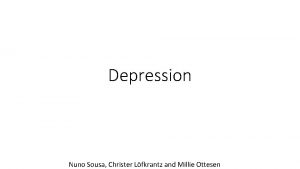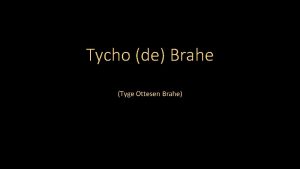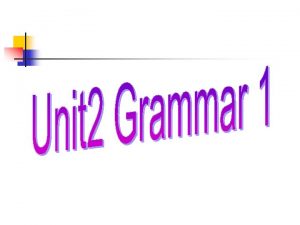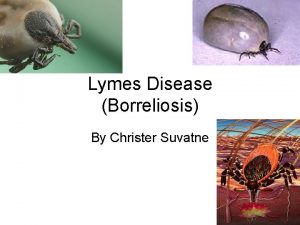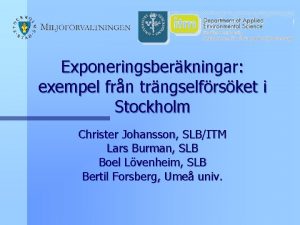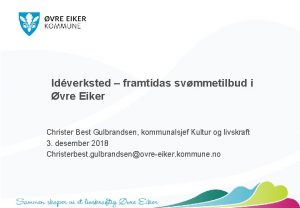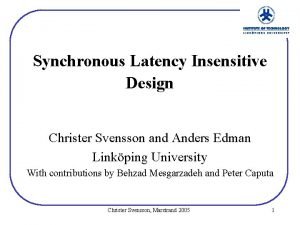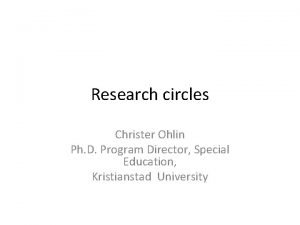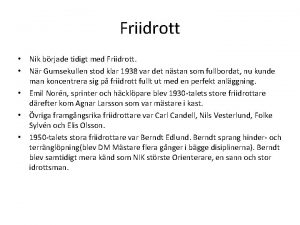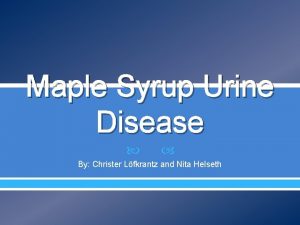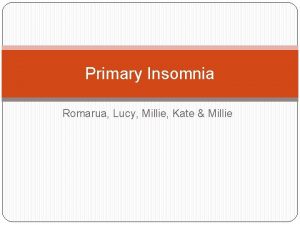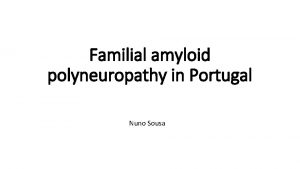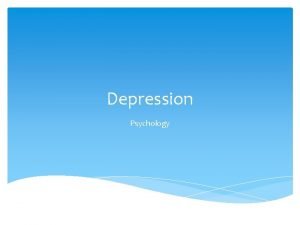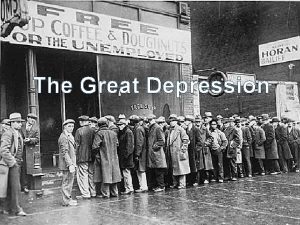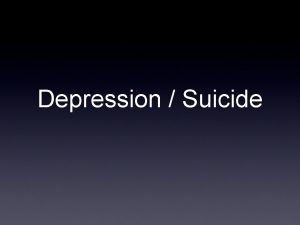Depression Nuno Sousa Christer Lfkrantz and Millie Ottesen
















- Slides: 16

Depression Nuno Sousa, Christer Löfkrantz and Millie Ottesen

Depression • Depression is a common mental disorder, characterized by sadness, loss of interest or pleasure, feelings of guilt or low self-worth, disturbed sleep or appetite, feelings of tiredness, and poor concentration.

Depression • Long-lasting or recurrent, substantially impairing an individual’s ability to function at work or school or cope with daily life. • At its most severe, depression can lead to suicide. • When mild, people can be treated without medicines but when depression is moderate or severe they may need medication and professional talking treatments.

Etiology • • • Abuse. Certain medications. (ex: isotretinoin). Conflict. Death or a loss. Genetics (family history of depression may increase the risk) Major events. Other personal problems. Serious illnesses. Substance abuse. (nearly 30% of people with substance abuse problems also have major or clinical depression. )


Symptoms • Slow wave pattern left frontal area • Right frontal area domination • Sleep • Appetite • Dysphoria • Fatigue • Anhedonia • Concentration • Esteem • Suicidal thoughts

Diagnosis • 5 of SADFACES present for 2 W • GP – psychiatrist – psychologist • 2/3 misdiagnosed in rural areas • MSE – standard • No lab-test • Differential – hypothyroidism, sepsis


Treatment • • • Drugs Psychotherapy Electric shock treatment Interpersonal therapy Psychodynamic therapy Cognitive behavioral therapy

Drugs • Only about 30% of people with depression go into full remission after taking their first course of antidepressants. Some people need more than one medicine for treatment. Some antidepressants work better for certain individuals than others. • Selective serotonin reuptake inhibitors – SSRI’s • Tricyclic antidepressants – TCA’s • Monoamine oxidase inhibitors – MAO’s • Side effects? • Drugs affecting neurogenesis

Psychotherapy • Is an effective therapy, but may not be enough on its own. It is often combined with other treatments as for example medications. • It's used to help the person find ways to deal with everyday stressors. What Are The Benefits? • It can help ease stress. • It can give you a new perspective on problems. • It can make it easier to stick to your treatment. • You can use it to learn how to deal with side effects from your medicine • You learn ways to talk to other people about your condition. • It helps catch early signs that your depression is getting worse.

Electroshock therapy • Electroconvulsive therapy (ECT), can be used to treat major depression that hasn't responded to standard treatments. • It is among the safest and most effective treatments available for depression. With ECT, electrodes are placed on the patient's scalp and a finely controlled electric current is applied while the patient is under general anesthesia. The current causes a brief seizure in the brain. • ECT is one of the fastest ways to relieve symptoms in severely depressed or suicidal patients. It's also very effective for patients who suffer from mania or other mental illnesses.

Interpersonal therapy • Interpersonal therapy, or IPT, is a short-term, limited-focus treatment for depression. Studies have shown that IPT, which addresses interpersonal issues, may be as effective as short-term treatment with antidepressants for mild to moderate forms of clinical depression. • By addressing interpersonal issues, interpersonal therapy for depression puts emphasis on the way symptoms are related to a person's relationships, including family and peers. • The immediate goals of treatment are rapid symptom reduction and improved social adjustment. • The long-term goal is to enable people with depression to make their own needed adjustments.

Pshychodynamic therapy • Psychodynamic therapy is designed to help patients explore the full range of their emotions, including feelings they may not be aware of. • By making the unconscious elements of their life a part of their present experience, psychodynamic therapy helps people understand how their behavior and mood are affected by unresolved issues and unconscious feelings.

Cognitive behavioural therapy • CBT aim to help their patients change patterns of behavior that come from dysfunctional thinking. • Negative thoughts and behavior predispose an individual to depression and make it nearly impossible to escape its downward spiral. • When patterns of thought and behavior are changed, so is mood.

Sources • • • http: //www. who. int/topics/depression/en/ http: //www. webmd. com/depression/guide/causes-depression#1 http: //www. thebrainperformancecenter. com/conditions-and-symptoms/depression/ https: //www. ncbi. nlm. nih. gov/pmc/articles/PMC 2748674/ http: //www. webmd. com/depression/guide/interpersonal-therapy-for-depression#1 http: //www. webmd. com/depression/guide/cognitive-behavioral-therapy-fordepression#1 http: //www. webmd. com/depression/guide/psychodynamic-therapy-for-depression#1 http: //www. webmd. com/depression/guide/electroconvulsive-therapy#1 http: //www. webmd. com/depression/guide/treatment-resistant-depressionpsychotherapy#1 http: //www. webmd. com/depression/guide/optimizing-depression-medicines#2
 Millie ottesen
Millie ottesen Nuno aghdassi
Nuno aghdassi Nuno cravo
Nuno cravo Tyge ottesen brahe
Tyge ottesen brahe The robots are talking about millie
The robots are talking about millie Tick
Tick Christer karlsson
Christer karlsson Per holmlund meteorolog
Per holmlund meteorolog Gjk algorithm
Gjk algorithm Christer best gulbrandsen
Christer best gulbrandsen Christer pursiainen
Christer pursiainen Christer pallin
Christer pallin Christer svensson
Christer svensson Christer ohlin
Christer ohlin Njurunda ik
Njurunda ik Miguel sousa neves
Miguel sousa neves Frei luis de sousa estrutura interna e externa
Frei luis de sousa estrutura interna e externa
